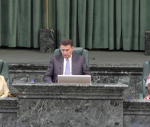You are here
The two-term itch
Nov 26,2017 - Last updated at Nov 26,2017
In 1998, my wife, a great admirer of Nelson Mandela, was flabbergasted when a South African friend and an Afican National Congress activist said to her: “Mandela has accomplished his mission. Now we need someone to manage the economy.”
The following year, Mandela completed his term as president and retired, and when he died in 2013, he was mourned all over the world.
Compare this with the absurd scene, last week, of a nonagenarian clinging to his seat of office like limpets to rocks, while those around him worked to extract him from it without hurting him.
The idea of a republic is good when it works, but it conflicts with one of the most powerful human instincts: acquisitiveness.
Presidents everywhere have always been tempted to strengthen their power by bribing the active and enterprising whom they cannot intimidate or, as de Tocqueville put it, bribing the public with the public’s money.
The result is often a system where presidential terms of office are extended by constitutional amendments promulgated in less time than it takes an average family to decide what to have for dinner the following day.
And not to be outdone in political science, the Arab world, forever fastidious about pedigree, gave the world the ultimate oxymoron: the “hereditary republic”.
Republics are like TV drama. They need to change often and for the same reasons. In the first season, a good TV drama introduces new ideas and new characters that interact very well and fulfil their function. In the second season, the show becomes formulistic, and in the third, characters and the interaction between them become exaggerated and yawn making.
A good example from the Arab world was President Habib Bourguiba, the Tunisian leader from 1956 till 1987.
In the 1950s and 60s, he was a farsighted reformer who worked ably to lead his country to modernity. Later, in his eighties, he was a shadow of his old self, who stayed in office by sheer dint of nostalgia.
I remember the day when a Tunisian colleague of mine told me that there was a peaceful coup in his country and that Bourguiba was sent into retirement. I felt admiration for Tunis for having the courage to take a painful step that had become necessary, and the grace to preserve the old president’s dignity.
Unfortunately, though, the system had not prepared for succession. The new leader lacked the credentials to do anything except hold power, so the challenges mounted and resulted in the Jasmine revolution.
For this and many other reasons, the conference “Arab monarchies”, in which I participated in Paris in 2001, found that Arab monarchies are often more pluralistic and responsive to their people than Arab republics, which were described as “quasi-monarchic systems”.
The fundamental conundrum is that thinkers busy themselves with debates over political systems, while their people yearn for jobs and food on their table; hence the failure to address what Plutarch called “the oldest and most fatal ailment of all”: the imbalance between rich and poor.













